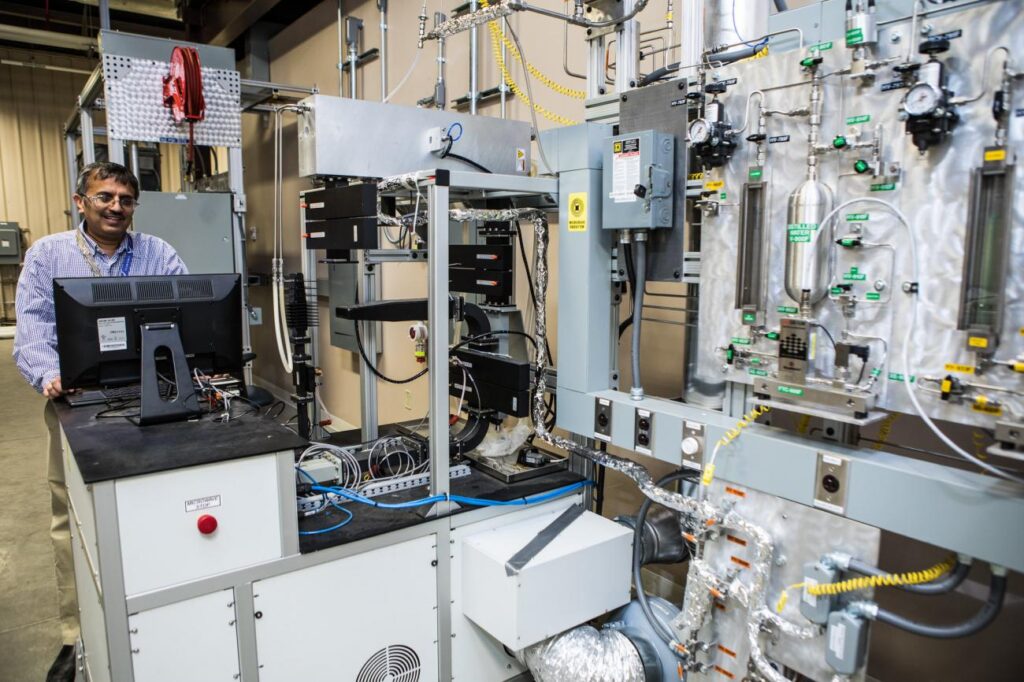
Throughout 2023, NETL created substantial innovations for converting carbon dioxide (CO2) into useful products, a vital step in achieving economical decarbonization.
This year, NETL researchers grew versatile biocatalysts using microbes from a coalbed methane (CBM) well to convert industrial CO2 wastes and other single-carbon compounds into useful chemicals to manufacture biofuel, food additives and other high-value products while reducing emissions of greenhouse gas.
In testing completed at the Lab, researchers found the microbes from the CBM well, which was drilled in an Appalachian coal seam as part of a mining operation, generated a biocatalyst that outperformed other biocatalysts from microbes collected at oil and natural gas well sites and other locations.
“Microorganisms have a diverse metabolism and can drive many chemical reactions,” said NETL’s Djuna Gulliver, an environmental engineer. “However, when they are grown and enriched in our laboratory, they can serve as highly capable tools that convert CO2 to acetate, an inexpensive chemical that has a wide range of uses.”
The recently developed biocatalyst converts the CO2 feedstock into what Gulliver calls “bio-acetate,” which can then be used to produce food additives, a pickling agent, a laboratory reagent, and other useful products. It also can act as a feedstock to be further converted into butanol, a biofuel. Butanol is often referred to as a “drop-in fuel” because it can be directly substituted for fossil fuels without the need for costly engine modifications.
NETL researchers also invented a new self-healing cold spray coating for use inside pipelines that protect against corrosion, a common problem that can cause catastrophic failure events such as explosions and emissions of environmentally damaging substances like methane.
Traditional approaches to fighting pipeline corrosion included use of inhibitors or organic coatings such as fusion-bonded epoxy and polyurethane. Injection of inhibitors in natural gas or CO2 pipelines is challenging because of the difficulty of transporting the inhibitor along the pipelines. The main disadvantage of using organic coatings for internal pipeline protection is that they have poor abrasion resistance and can form a corrosion focal point.
“The invention consists of a new zinc-rich material that creates an effective protective layer which resists dissolution compared to existing zinc sacrificial coatings,” said NETL’s Ömer Doğan, who worked on the innovation with NETL researchers Joseph Tylczak, and Margaret Ziomek-Moroz. ‘This new material can be applied to steel structures in a cold spray process to protect them from the effects of corrosion.”
Cold spray is a high-energy solid-state coating and powder consolidation process for application of metals, metal alloys, and metal blends for numerous applications. Cold spray uses an electrically heated high-pressure carrier gas, like nitrogen or helium, to accelerate metal powders through a supersonic nozzle for particle adhesion. The coating can be applied to the interior of a pipeline by using a robotic cold spray device attached to a pipeline pig.
About the National Energy Technological Laboratory
NETL is a U.S. Department of Energy national laboratory that drives innovation and delivers technological solutions for an environmentally sustainable and prosperous energy future. By using its world-class talent and research facilities, NETL is ensuring affordable, abundant and reliable energy that drives a robust economy and national security, while developing technologies to manage carbon across the full life cycle, enabling environmental sustainability for all Americans.
Source
National Energy Technology Laboratory, press release, 2023-12-26.
Supplier
US Department of Energy (DoE)
US DOE - National Energy Technology Laboratory (NETL)
Share
Renewable Carbon News – Daily Newsletter
Subscribe to our daily email newsletter – the world's leading newsletter on renewable materials and chemicals









